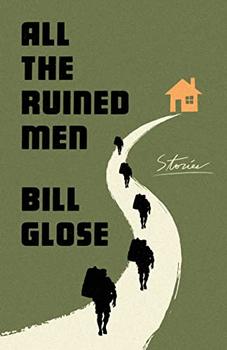Book Club Discussion Questions
In a book club? Subscribe to our Book Club Newsletter and get our best book club books of 2025!
For supplemental discussion material see our Beyond the Book article, Suicide Among Combat Veterans and our BookBrowse Review of All the Ruined Men.
Please be aware that this discussion guide will contain spoilers!
-
Bryce Pearson was disfigured by a bomb blast. In "Dead Man's Hand," his face now bears "two puckered lines jagging from his mouth to his neck, another one slicing across his right cheek." In what other ways have soldiers in his squad been ruined by war?
-
Why does Pearson drive Darrell to the recruiting station if he doesn't really want him to enlist? Do you think Pearson made a mistake?
-
Pearson compensates for his disfigurement by confronting the "unblemished public… like a form of combat." In what ways do other veterans from his squad show that they also have not adjusted well to civilian life?
-
Staff Sergeant Berkholtz swapped off his guard duty the day the bomb ended up killing Private Pearson. At the time, he'd told Pearson, Rank has its privileges, with a smirk. How do Berkholtz's rank and responsibility weigh on him afterwards?
-
How differently do the soldiers act among themselves compared to when they are with other friends and family?
-
When the veterans dare to hope, their desires are often intertwined with love for others. How does that work out for them?
-
War affects not only the soldiers who fight in it, but their families as well. How have different family members been impacted by their sons, brothers, fathers, and husbands fighting in Iraq and Afghanistan?
-
In "Red Legs," Lewis has experienced a near-fatal parachuting incident and Anoush is suffering from a fatal disease. How has fear transformed these two characters differently?
-
In "Dog is Not a Palindrome," the title plays with the sense that "Dog" is a reversal of "God." How has Curt Bradshaw's faith been shaken? How was this shown throughout the book?
-
In the confessional, Bradshaw tells the priest, "I'm a lost cause, Father." Do you agree with that statement?
-
In "Her Brother's Apartment," what do the glass globes suggest about the type of person Bradshaw was trying to be?
-
In "Sacrifices," what sacrifices do Brendan and Sophia Mueller make for the sake of their relationship?
-
At the outset of "What Won't Stay Buried," Daniel Faust seems to have put his war experiences behind him. How does that all change after an employee on his shift is injured by one of the factory's machines?
-
In several of the stories, the veterans throw themselves into their work—Bradshaw as a pool construction laborer, Faust as a factory supervisor, Zahn as a night-shift stock boy, and Mueller as a slaughterhouse worker. Has dedication to work benefited (or harmed) any of them?
-
Stoicism often serves as a fortress for veterans. In "Bright, Inconsequential Things," how does trying to ignore his past affect Reuben Zahn's present?
-
When Pearson calls Faust on Oscar night in "What Won't Stay Buried," he is drunk and close to tears. How has survivor's guilt weighed differently on these two veterans?
-
In "Penultimate Dad," when Mueller brainstorms ideas for what he can teach his daughter, what does he learn about himself?
-
Between 2000-2018, US soldiers suffered 225,144 traumatic brain injuries. In "All the Fractured Pieces," we view various fragments of Royce Terfertiller's life as he lies in a hospital bed. When we see him again in "Falling Backwards," how has his brain injury changed the course of his life?
-
Knowing how things eventually turn out, does re-reading the final paragraph in the first story, "In the Early, Cocksure Days," bring up any different emotions? (Mueller bellows a long, wolfish howl and wraps Bradshaw in a hug. Then the rest of the squad collapses on them in a back-slapping scrum, wrapped in the glee of the moment, each of Berkholtz's boys certain he will live forever.)
Unless otherwise stated, this discussion guide is reprinted with the permission of St. Martin's Press.
Any page references refer to a USA edition of the book, usually the trade paperback version, and may vary in other editions.
